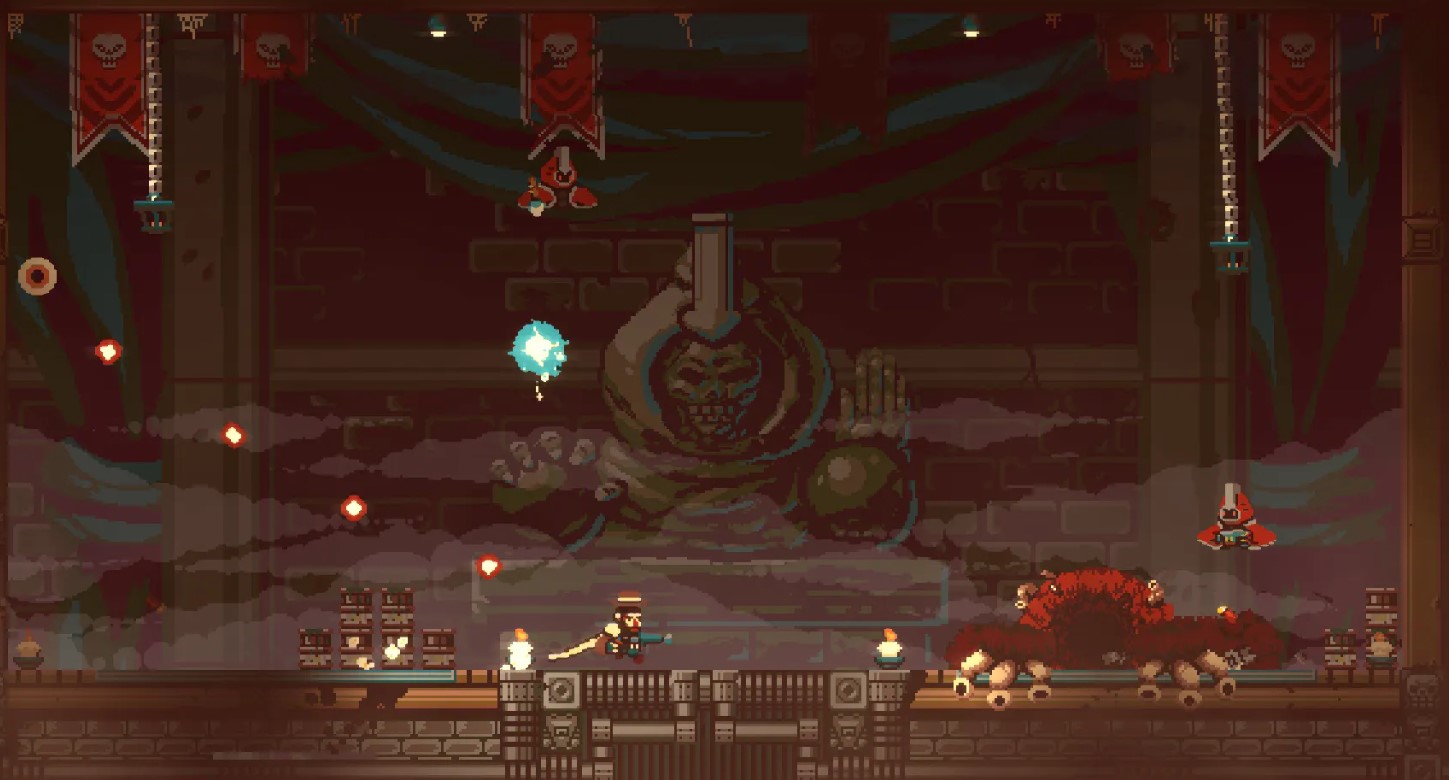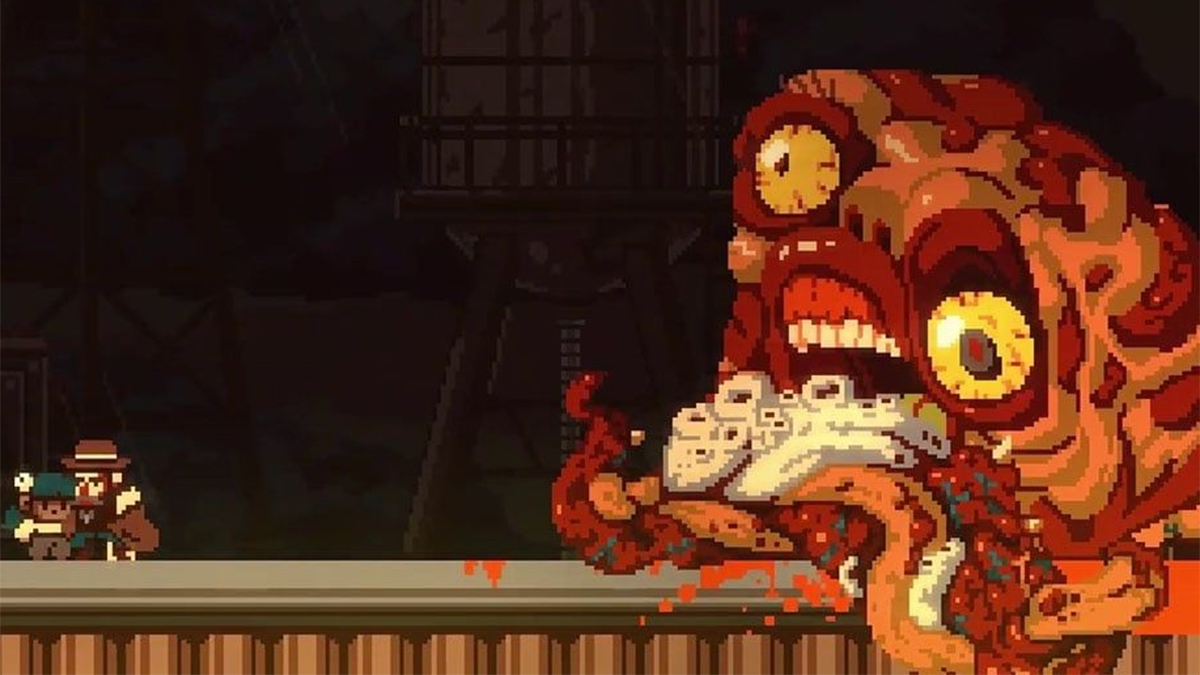It’s a simple story, really. Man goes to pick mushrooms. Man sees his house is on fire. Man hurries back to find his wife murdered and his infant child kidnapped.
Games don’t need to spend much time on their story. We have titles like Journey and Super Metroid, where the story is told mostly through gameplay, and we have games like Tetris, where the gameplay is abstracted to the point the story is mostly absent. Spending time on a story is a choice, and if you’re going to do it, you should have a damned good reason to do so.
Gunbrella chooses to spend a lot of time on a tired story. It’s a revenge narrative where a mournful husband chases down his wife’s killer and rescues his stolen baby. It’s a story told so often it has its own set of tropes, and to be honest, I’m sick of them. If you’re going to tell a story like this one, you should try doing something different, or your story will feel dated as soon as it’s released.
Since at least 2010, people have talked about the “daddening” or “dadification” of games. While this was mostly in regard to daughter companion characters, dead wives and kidnapped children are a highly related trope. Heavy Rain features a kidnapped child, and you’re a dad. Fallout 4 features a dead spouse and a kidnapped child, and you can choose to be a dad. God of War, Castlevania: Lords of Shadow, Dante’s Inferno, Middle-earth: Shadow of Mordor. All dads with dead wives seeking revenge.
Some of these stories handle it well, and some don’t, but that isn’t really the point. The point is, if you’re going to tell this story now, you should probably do something interesting with it.
The gameplay of Gunbrella doesn’t inherently imply a story about grief or revenge. It’s a game where you do sick jumps with a gun that’s also an umbrella, and shotgun cultists and wild animals until they explode into blood. They could have told any story that justified you killing some people, and in fact, the game provides an alternate explanation for most of the people you’re killing; they’re destroying the planet.
Related: Gunbrella Review in 3 Minutes

Gunbrella’s narrative doesn’t spend much time explaining why you should care about your dead wife. She shows up in exactly two scenes. One where she’s a dead body, and a flashback to the moments before her death, when she asks her husband to go pick some mushrooms. She barely speaks.
But Gunbrella does show you the effects of manmade climate change and fossil fuels on its world. A large corporation mines Crude, a crystalline substance that can power almost anything. Of course, mining it frees a plague of vengeful spirits that were previously resting inside the Crude. For each piece mined, another spirit terrorizes the land. But the corporation has found a way to both protect themselves from the spirits, and deal with the diminishing supply of Crude: human sacrifice.
This is not subtle stuff. They are melting people down into fossil fuels in order to power their society, and protecting themselves with violence while they cause the apocalypse. The game spends a bunch of time on how the cultists are trying to end the world through human sacrifice, then compares them to the corporation that’s sacrificing people because they need more fossil fuels.
When you find your wife’s killer, you discover his reason for killing her was just greed. He needed your daughter because agreeing to sacrifice her in the future got him into the safe, clean society they run. The dead wife and kidnapped child are there to add a personal reason to go on this journey, but it really could have been anything.
One way to justify this kind of narrative is to make the wife or child interesting characters. As discussed above, the wife gets almost no development, but the same turns out to be true of your child. While she’s stolen as an infant, she does become old enough to speak… and speaks about four lines of dialogue in the entire game.
The wife and child aren’t really characters. They’re macguffins, things that are only there so other characters have something to fight over. Gunbrella lacks a deep dead wife, and it lacks an interesting take on the trope. But the rest of its story is actually pretty good?
Like, the climate change stuff is heavy handed, but it’s also quite believably written. The people aren’t cartoonishly evil, they completely believe that they’re doing the right thing, that a non-human sacrifice solution is just around the corner. The cultists are outlandish, but the people fighting against them are likeable, with often funny dialogue. I still remember Marle’s name because she was brash, showed up more than once, and helped me sneak into a facility. I genuinely don’t know if the wife even has a name.
Gunbrella isn’t uniformly poorly written. The dead wife just creates a black hole of writing that distorts everything around it because the writers failed to make it interesting.
The opening of Fallout 4 is almost exactly like Gunbrella’s, and although it’s still cheap pathos, it at least tries something different. When you finally emerge from cryostasis and find your kidnapped son, you’re decades too late. He’s a 60 year-old man whose values have been shaped by the life he lived without you. This doesn’t help with your murdered wife or husband’s characterization, but it’s at least an interesting concept to shake up the trope, something Gunbrella lacks.
I once picked up a game called Dragon Blade: Wrath of Fire from the bargain bin for about five dollars, and the first thing that happens is your fiancée is murdered. I laughed at how transparently it had killed a barely relevant woman to give its male lead pathos, and this was in 2007.
Gunbrella’s dead wife trope feels like it came from the bargain bin. Its gameplay and other writing don’t, and it’s a shame for the game to drag itself down this way. And the worst part of all is, he didn’t even keep the mushrooms. Your wife died for those mushrooms, man.






Published: Sep 18, 2023 05:00 pm